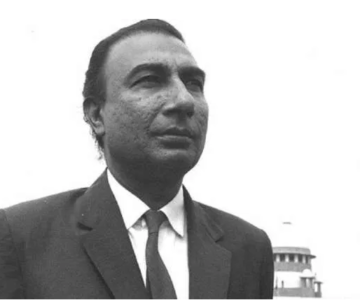Herat Hami
A poem by Wimalaratne Kumaragame (a translation)
Herat Hami who lived in Aliya Watunu Wawe*1
Even someone like me was more important than him
Though Harat Hami cut dead bodies*2
He was twenty, thirty times more decent than me
In the hospital of Aliya Watunu Wawe
He spent his time removing night soil
Though he lived happily with a monthly salary
Whenever I saw him I was moved with sadness
A hard, wiry body, handsome and thin
Not much of age, fresh and young
No wife as yet
I was perplexed by the job he did
Making someone like me sad
Each day he carried my excrement
If someone dies suddenly
Doctor comes
He cut the dead bodies in front of us
None from the farmer, worker or elite caste
Ever did such a job
No known disease of mind he had
He did no harm to any dwellers of the forest
He spread a docile smile
Every word of his spread ahimsa
Every evening he drank burning water
His heart overflowed with kindness
His sister was stabbed
Recalling her my eyes get wet
He did not cry the day his sister died
When she had a fever he wailed with tears in his eyes
When his younger sister died he went with a doctor
Her dead body was cut by Herat Hami
Though the villagers blamed him in harsh words for this
He did not care much about the world’s violent flesh
As he was not born in a rich mansion
He went to the temple at every Poya
He was a member of the newly built stupa
Even more than that he respected Iyyenayaka*3
Translation by Basil Fernando
Explanation of some local terms and expressions:
*1(The Tank Where the Elephant Fell – the name of a rural village)
*2 It was customary some time back for a lower ranking employee to do the cutting of the dead body while the doctor was doing the autopsy. This custom still prevails in many parts of India.
*3 A popular god figure among the rural folk in Sri Lanka
******************************
A poem by Basil Fernando
The Blood she sheds
The blood she sheds
Is hers
Red and creative
Promising and life giving
She is truly the earth
Where then is the source
This destruction
Wanton shedding of blood
Erasing hopes and wooing death
Truly not from her earth
About the poets below –
Wimalaratne Kumaragame was one of the well known names among the groups of poets who are known as Colombo poets. This group of poets wrote poetry on matters close to the ordinary folk of Sri Lanka. They usually followed the four-lined stanzas or traditional poetic expression. However, their language was simple and at one time in almost all Sinhala households their poems were sung.
Wimalaratne Kumaragame was unique among these poets due to his deep understanding of the rural folk in the remotest villages. He was a civil servant and therefore would have been a well educated person and having taken a great interest in the people he worked for he was able to get inside their psyche. He can be said to be the poet of the folk psychology in Sri Lanka. Like this poem, he wrote several others regarding rural folk, demonstrating their inner character and their spirit. Thus, his poetry helps us to understand the folk spirit of Sri Lanka.
Much of Sri Lankan literature after about the 10th century was influenced by the Sanskrit language and literature which came through Indian invasions after the Anuradhapura period that ended around 1070 AD. The imitation of various forms borrowed from Sanskrit literature became quite a pastime. In fact, it can be said the rigid adherence to form became part of the Sri Lankan mind and psyche during this period. It was also during this period that a very rigid caste system was introduced into Sri Lanka. Rigid social stratification and extremely rigid social consciousness is part of the inheritance of this period of history. As a result much of Sri Lankan poetry of the subsequent centuries does not show very much of a folk spirit.
Separately, there was a folk poetry and, in fact, it became a normal activity among the rural folk to express themselves through poetry. There were even traditions of spontaneous creation of poems and poetry contests where different people would try to reply to opponents by way of poetry. It is this folk poetry that influenced the Colombo poets.
When the poetry loses its connection with the folk the poetry itself loses its power and beauty. From the mid 20th century there developed a branch of poetry known as free verse (Nisadas). This was an attempt to break away from the formal four-line stanza style and to choose styles which did not conform to any particular pattern. More well-known poets of this group belonged to the newly educated graduates from Sinhala backgrounds. The newly educated were also assimilating themselves into the elite or middle classes and they sought their audience in these social groups. The result was that poetry became disentangled from the folk and due to this it lost its power. This movement of free verse is now an accepted part of poetry writing but the work of these poets has failed to have the same appeal to the ordinary folk as did the poetry of the Colombo poets like Wimalaratne Kumaragame.
Underneath the poetic expressions of Wimalaratne Kumaragame it is not difficult to perceive a sense of indignation about what was being done to the rural folk during this time. In giving expression to their lives he also expresses their suffering, who, despite of such suffering were able to maintain their dignity and balance. Also there is an expression of defiance.
Among the Sri Lankan poets of the 20th century Wimalaratne Kumaragame enjoys a unique place. His work and the memory of his work needs to be revived, particularly the folk spirit that he brought into Sinhala poetry needs to be brought back to life. Whether a Sri Lankan poet writes in Sinhala, Tamil or English is not the real issue, the issue is whether he can express the folk spirit in a way Wimalaratne Kumaragame was able to do in his time. (comment by Basil Fernando)
Basil Fernando is a Sri Lankan poet and has published several collections of poems. An anthology of his poems entitled, Sundramaithry, has been translated into Malayalam by Dr. Dhanya Menon, and published in 2008. This is the first anthology of Sri Lankan poetry translated into any India language. His writings may be seen at www.basilfernando.net under literature.
Courtesy Asian Human Rights Commission



